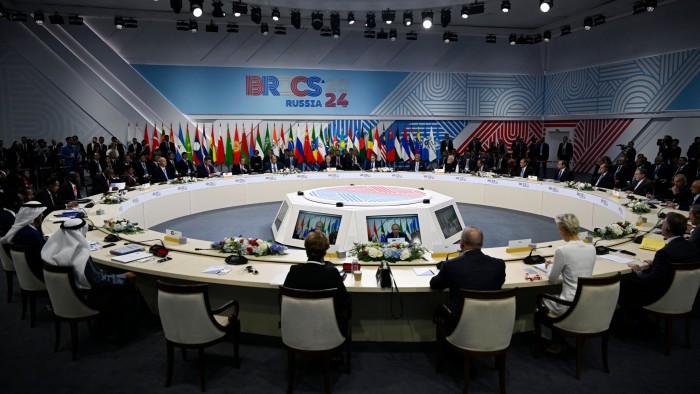Unlock the Editor’s Digest for free
Roula Khalaf, Editor of the FT, selects her favourite stories in this weekly newsletter.
The writer is president of Queens’ College, Cambridge, and an adviser to Allianz and Gramercy
Over my career, I have witnessed quite an evolution in how economists, market participants and policymakers have tried to group those countries that are not classified as “advanced economies”. What started decades ago as references to the “third world” and “less developed” countries evolved into “developing” and “emerging” economies. They were recently supplemented by the broader notion of a “global south”.
Shifts in the global economy are not only eroding the analytical usefulness of such an approach but also making it potentially damaging. In some countries, it has resulted in misleading policy thinking as well as unrealistic aspirations for bargaining power and strategic autonomy. The international order is being turned upside down. Unifying structural trends such as rising global trade and financial integration are being undermined by fragmentation. The imposition by President Donald Trump of further tariffs on China and the similar moves now delayed against Mexico and Canada mark the most recent escalation in this process.
To quote the World Bank’s latest global economic outlook for 2025, we are now in a world of “falling graduation prospects” for less affluent economies. They have to navigate a global economy that is vulnerable to more frequent and more violent external shocks — and at a time when countries need to position themselves to benefit from innovations such as artificial intelligence. In such an environment, both individual and collective problems will prove more challenging to solve. This calls for resisting fanciful thinking on new groupings and strategic autonomy.
When I first joined the IMF’s “Economist Programme” back in 1983, I was tutored on the importance of two operational principles that, at first sight, may appear contradictory to some: the uniformity of treatment for all the member countries and the pursuit of case-by-case approaches. The aim was to ensure that, from a top-down perspective, the adherence to important overarching principles was accompanied by granular and customised approaches that reflect bottom-up differences.
Similarly, the use of “global south” has sought to capture common attributes while making room for important country differences. Some see it as a unifying tool to pursue common objectives, and an umbrella for groupings such as Brics.
But the ability to turbocharge domestic development efforts through closer global economic and financial integration is undermined by the weaponisation of trade and investment flows and less respect for the rule of law. The current weakening of multilateral institutions also undermines the resolution of conflicts between countries and the robustness of support measures, including pooled insurance mechanisms to tackle issues such as debt overhangs and vulnerability to climate change. It is also not clear that the US will tolerate long-term dollar appreciation as an orderly contributor to global realignment, meaning less affluent countries might have less of a future currency advantage. All this comes at a time when, according to the World Bank, such economies are forecast to finish the first quarter of this century with the weakest long-term growth outlook in more than two decades.
The notion that, in response to actual and potential threats, a large grouping of these countries can quickly achieve strategic autonomy and prosper is unrealistic. This is not just about geopolitical choices that will be forced on many countries, except for a handful that have attributes that allow them to be “swing states” such as Brazil, India, Saudi Arabia and the United Arab Emirates. It is also about the structural fragmentation of the international order that will result in an increasing number of changing “coalitions of convenience” and, for some, dangerous marginalisation.
With that, the effectiveness and, indeed, desirability of a conceptual air cover such as the “global south” are seriously challenged. It will take time for the world to realise that its current path will undermine its collective wellbeing and that of the majority of countries. While some may be tempted to wait around for threats to lift or rely on new coalitions, this is not a good strategy, nor is continuing on policy autopilot.
Individual countries need to opt for more timely policy adjustments, stronger financial resilience and much greater agility in responding to adverse external shocks. This will be needed in a world that loses the presumption of global convergence and experiences more significant divides between advanced countries and less affluent ones — and also greater divergence within the latter group.
https://www.ft.com/content/098c9a5b-95a6-4843-929d-dd029aeee835


